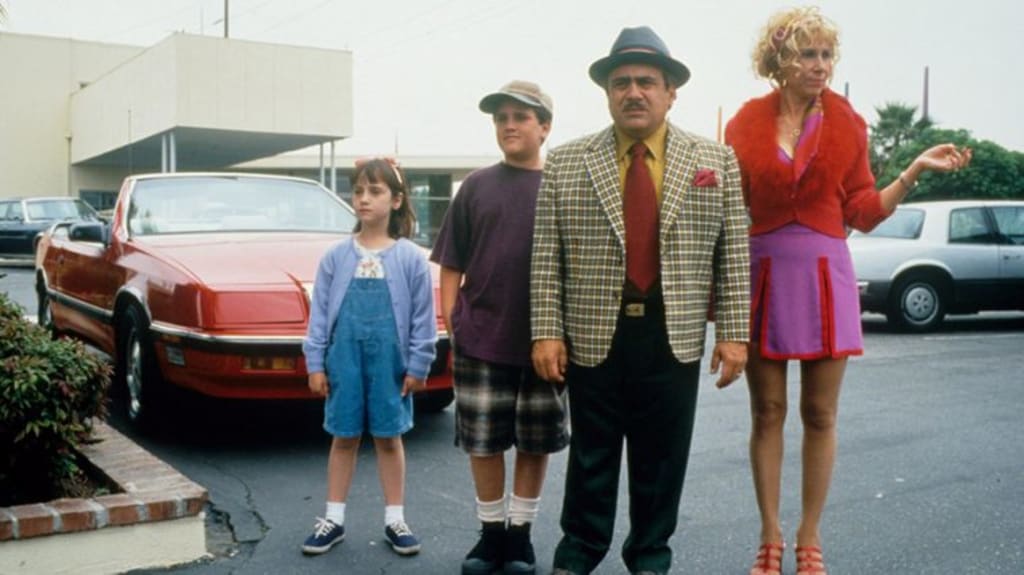
Released in 1996 and directed by Danny DeVito, "Matilda" is a heartwarming family film based on Roald Dahl's beloved children's novel of the same name. This enchanting tale follows the extraordinary journey of Matilda Wormwood, a highly intelligent and telekinetic young girl, as she navigates her way through an unjust world filled with neglectful parents and a tyrannical headmistress.
Matilda (Mara Wilson) is a gifted and curious child who finds solace in books and education. Unfortunately, her parents, Mr. and Mrs. Wormwood (Danny DeVito and Rhea Perlman), are indifferent towards her intellect and prefer shallow pursuits like watching television. Matilda's life takes a positive turn when she begins attending Crunchem Hall Elementary School, where she encounters the kind-hearted Miss Honey (Embeth Davidtz), who recognizes Matilda's brilliance and encourages her love for learning.
However, their school is ruled by the formidable Miss Trunchbull (Pam Ferris), a sadistic headmistress who despises children and is determined to maintain an atmosphere of fear. Matilda, armed with her extraordinary powers, stands up against the injustices perpetrated by Miss Trunchbull, igniting a captivating battle of wits between good and evil.
Themes and Messages "Matilda" explores several profound themes that resonate with audiences of all ages. At its core, the film emphasizes the transformative power of education and the importance of nurturing children's intellectual growth. Matilda's love for learning and the support she receives from Miss Honey showcases the significance of a caring and dedicated teacher in a child's life.
Another central theme is the celebration of imagination and the belief in oneself. Matilda's telekinetic abilities are a metaphor for the extraordinary potential that lies within every child. The film encourages viewers to embrace their unique talents and not let anyone undermine their dreams or potential.
Furthermore, "Matilda" tackles the issue of parental neglect and the yearning for a sense of belonging. Matilda's parents, who constantly dismiss her, serve as a stark contrast to the nurturing and compassionate Miss Honey. The film underscores the importance of finding supportive individuals who can foster a child's emotional and intellectual growth.
The film also explores the concept of standing up against injustice, with Matilda fearlessly challenging the oppressive authority of Miss Trunchbull. This serves as a powerful lesson for children, inspiring them to speak up against unfair treatment and fight for what is right.
Cinematography and Performances (approx. 400 words): Visually, "Matilda" captures the whimsical essence of Roald Dahl's storytelling. From the vibrant set designs of the Wormwood household to the dark and foreboding atmosphere of Miss Trunchbull's school, the film effectively contrasts different environments to enhance the narrative.
The performances in "Matilda" are exceptional, particularly from the young cast members. Mara Wilson shines in the titular role, portraying Matilda's intelligence, resilience, and vulnerability with remarkable maturity. She effortlessly carries the film, capturing the hearts of viewers with her charismatic and empathetic portrayal.
Danny DeVito, who not only directed the film but also played Matilda's comically neglectful father, delivers a memorable performance. DeVito's comedic timing and physicality add a delightful touch of humor to the story, creating a perfect balance between light-hearted moments and more poignant scenes.
Embeth Davidtz's portrayal of Miss Honey is heartfelt and endearing. She brings a sense of warmth and compassion to the character, forming a deep emotional connection
The main theme of the film "Matilda" revolves around the power of imagination and the pursuit of knowledge. Matilda, a highly intelligent and telekinetic young girl, uses her extraordinary abilities and her love for books to overcome adversity and challenge the injustices she encounters.
Throughout the film, Matilda's imagination serves as a source of strength and escape from her neglectful parents and the oppressive environment of her school, led by the tyrannical Miss Trunchbull. Matilda finds solace in books and creates a world of wonder and possibility within her mind. This theme highlights the transformative and empowering nature of imagination, as it allows Matilda to rise above her circumstances and forge her own path.
Additionally, the film emphasizes the importance of education and the role of nurturing mentors in a child's life. Matilda's relationship with Miss Honey, her kind-hearted teacher, showcases the profound impact that a caring and supportive figure can have on a child's development. Miss Honey recognizes Matilda's brilliance and encourages her love for learning, ultimately empowering Matilda to embrace her intelligence and use it to make a difference.
Another prominent theme in "Matilda" is the rejection of societal norms and the celebration of individuality. Matilda's parents, who prioritize shallow pursuits and dismiss her intellectual pursuits, represent conformity and mediocrity. In contrast, Matilda embraces her unique abilities and refuses to let societal expectations define her. The film encourages viewers to embrace their own individuality and not be afraid to be different or pursue their passions.
The theme of standing up against injustice is also significant in "Matilda." Matilda refuses to be intimidated by Miss Trunchbull's oppressive rule and uses her wit and powers to challenge her authority. This theme reinforces the importance of speaking up against unfair treatment and fighting for what is right.
In summary, the main themes of "Matilda" include the power of imagination, the pursuit of knowledge and education, the celebration of individuality, and the courage to stand up against injustice. These themes resonate with audiences of all ages, as they encourage viewers to embrace their unique qualities, nurture their intellectual growth, and have the courage to make a positive impact on the world around them.
"Matilda" has had a significant impact on society since its release in 1996. The film addresses several social issues and conveys important messages that have resonated with audiences of all ages. Here are some key impacts the film has had on society:
1. Empowering Children: "Matilda" empowers children by showcasing the strength and resilience of a young girl who uses her intelligence and imagination to overcome challenges. The film encourages children to believe in their abilities, stand up against injustice, and embrace their individuality.
2. Education and Love for Learning: The film highlights the transformative power of education and emphasizes the importance of nurturing a love for learning. Matilda's relationship with Miss Honey promotes the idea that dedicated teachers can have a profound impact on children's lives, fostering a positive attitude towards education.
3. Confronting Injustice: "Matilda" encourages viewers to stand up against injustice and oppression. Matilda's battle against the tyrannical Miss Trunchbull inspires individuals to speak out against unfair treatment and fight for what is right.
4. Challenging Gender Stereotypes: The film challenges traditional gender roles and stereotypes by featuring a strong and intelligent female protagonist who defies societal expectations. Matilda serves as a role model for both girls and boys, encouraging them to break free from stereotypes and pursue their passions.
5. Imagination and Creativity: "Matilda" celebrates the power of imagination and creativity. The film encourages individuals to tap into their imagination, embrace their creativity, and explore the boundless possibilities that lie within their minds.
6. Family Relationships: The film sheds light on the importance of nurturing and supportive family relationships. Matilda's neglectful parents highlight the negative impact of parental indifference, while her bond with Miss Honey highlights the positive influence of caring mentors and surrogate family figures.
7. Literary Appreciation: "Matilda" promotes a love for literature and encourages children to explore the world of books. The film showcases the transformative and empowering effects of reading, inspiring viewers to embrace the joy of reading and storytelling.
In conclusion, "Matilda" has had a profound impact on society by empowering children, promoting education and love for learning, encouraging individuals to confront injustice, challenging gender stereotypes, celebrating imagination and creativity, highlighting the significance of family relationships, and fostering literary appreciation. The film's messages continue to resonate and inspire audiences, making it a timeless classic that has left a lasting impression on society.
About the Creator
Murali MR
My website provide wide range of information innovating technology current trending topics






Comments
There are no comments for this story
Be the first to respond and start the conversation.